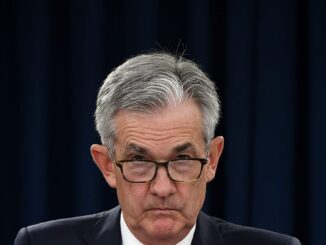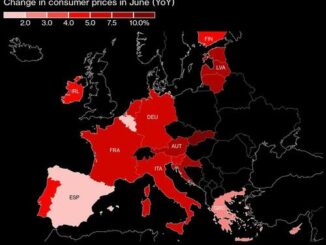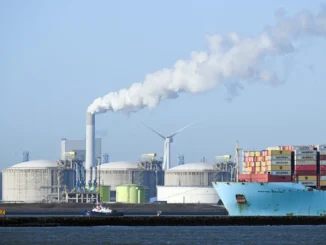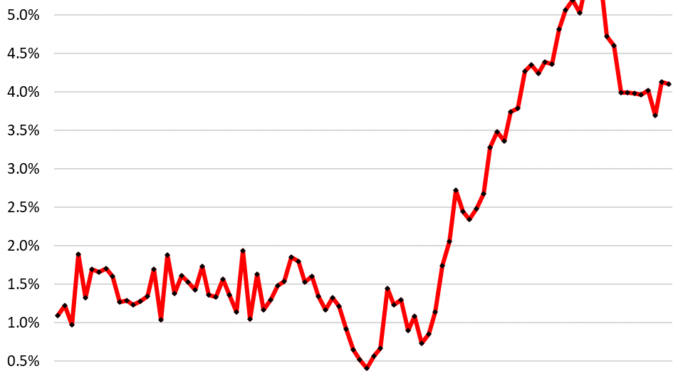
By Wolf Richter for WOLF STREET.
In the 20 countries that use the euro, inflation in services increased again by 4.1%, same increase as in May – and both were the highest since October. The service CPI has gotten stuck at around 4% year-over-year for the eighth month in a row, after coming down substantially to that point.
On a month-to-month basis, services CPI jumped by 7.4% annualized and has been in that range and higher over the past five months. These super-volatile and highly seasonal month-to-month readings tend to be red-hot in the first half of the year and then fall later in the year.
What we can see, however, is that these month-to-month increases have been running slightly hotter over the first half this year than a year ago, indicating that the 4%-plus range for services inflation appears to be baked into the economic cake now.
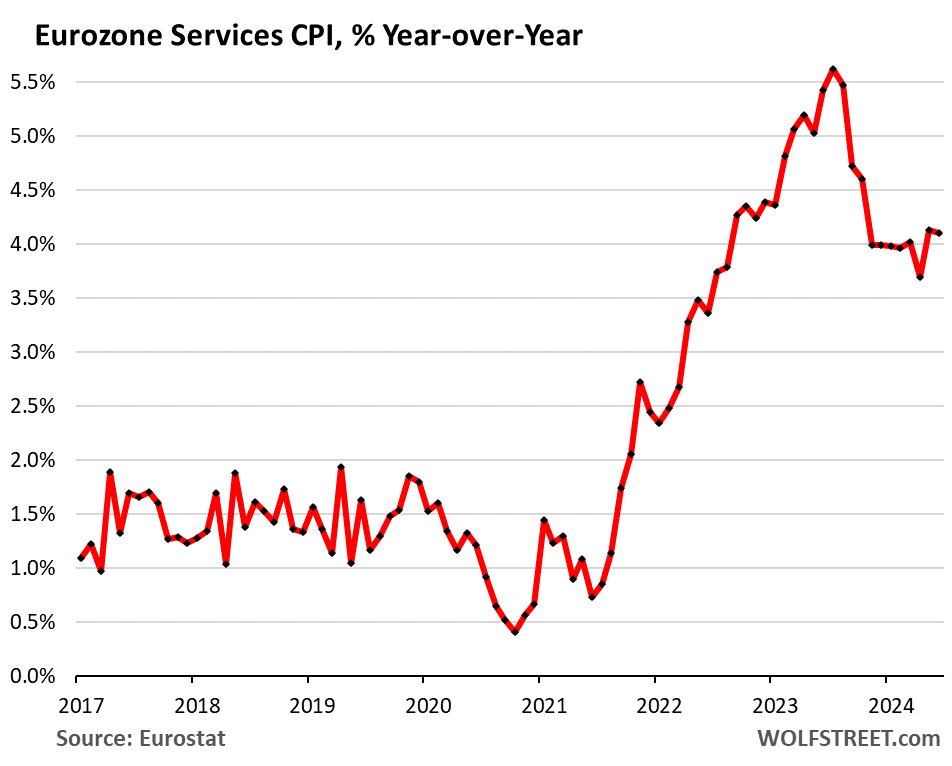
Energy prices (gasoline, diesel, natural gas, electricity, etc.) have dropped sharply from their sky-high levels in 2022 and have leveled out on a year-over-year basis. But they remain high. This chart shows the price level of the energy index, not the year-over-year change:
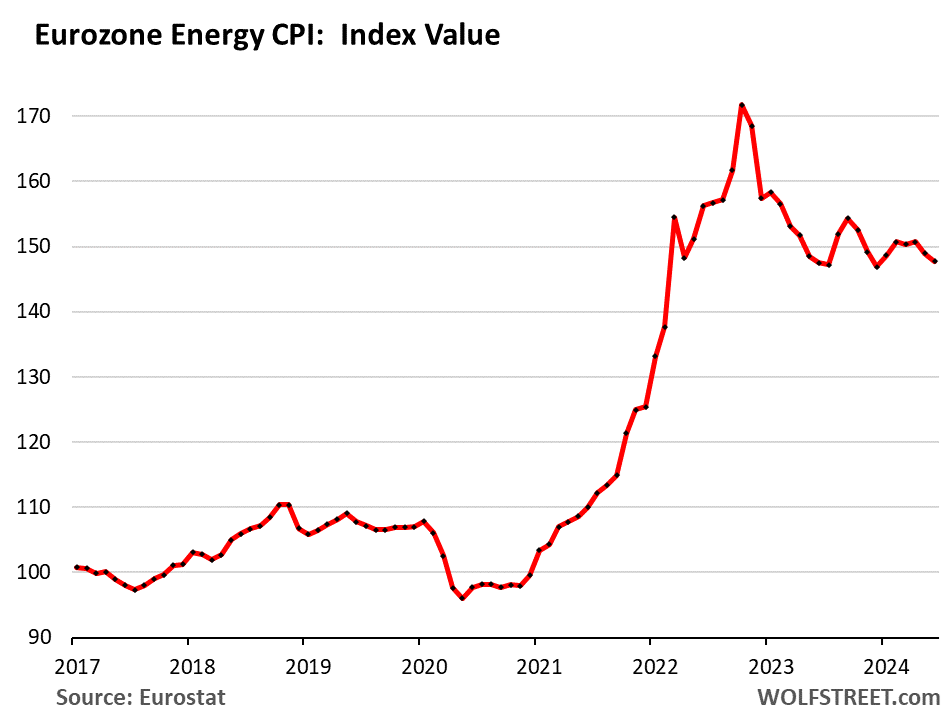
Prices of durable goods have also dropped from the peak. Food prices, after the spike, have not come down but have slowed their increases to less then 2% year-over-year. And these dynamics are playing out in other major economies, including in the US. The problem is still inflation in services, and that’s where consumers spend the majority of their money.
Many services are essential to modern life, such as housing and related services, healthcare, insurance, broadband and telecommunications, auto repairs, transportation, etc. Inflation is notoriously hard to eradicate from services.
Core CPI – which excludes food, energy, and tobacco products – rose by 2.9% in June, same as in May, and up from April (2.7%). This is the measure that the ECB uses for its inflation target of 2%. The drop in goods prices pushed down core CPI while the 4.1% services CPI pushed it up.
The chart below shows both core CPI (blue) and services CPI (red), along with the ECB’s target (green) because…
There will come a time when the sharp decline in goods prices will end, and then goods prices will no longer have the same downward force in core CPI that they’re now having, which would cause the classic relationship between core CPI and services CPI to reappear, where core CPI is only slightly lower than services CPI. If services CPI is then still at around 4%, core CPI will be at 3.5%-plus.
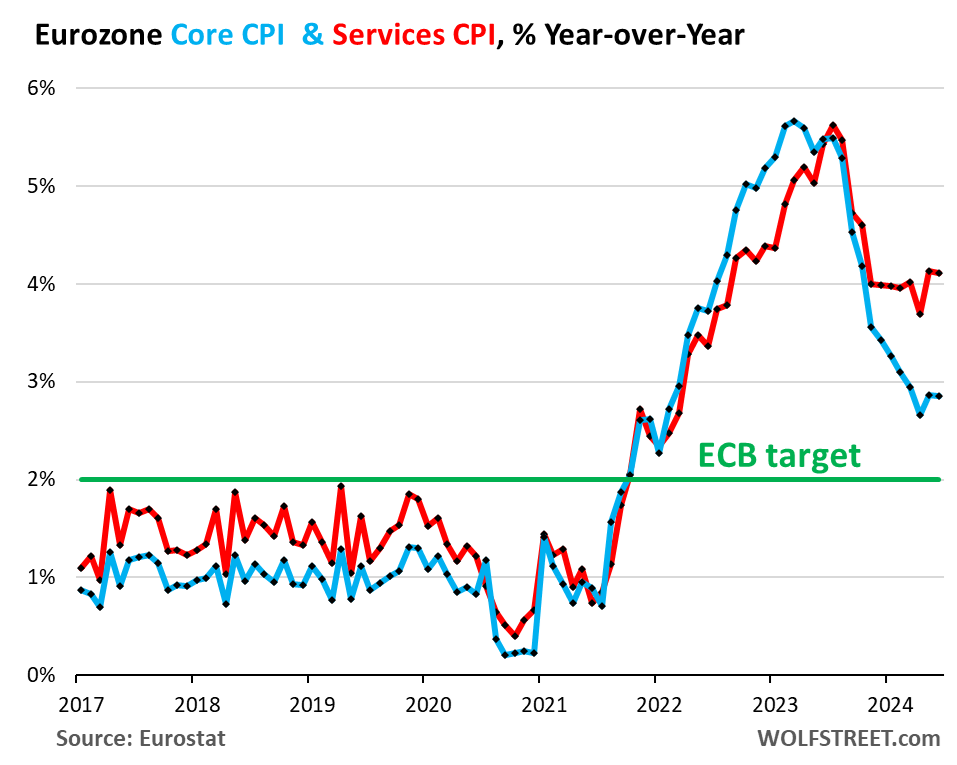
Overall CPI has been rising essentially at around 2.5% year-over-year since November, with the energy price drops having leveled off recently, with durable goods prices falling more steeply, with food prices rising below the 2% range, and with services rising at 4.1%.
It too is subject to the problem that goods prices will not continue to fall at the current rate, while services CPI is stuck at 4%. If that happens, overall CPI will reflect it by heading higher:
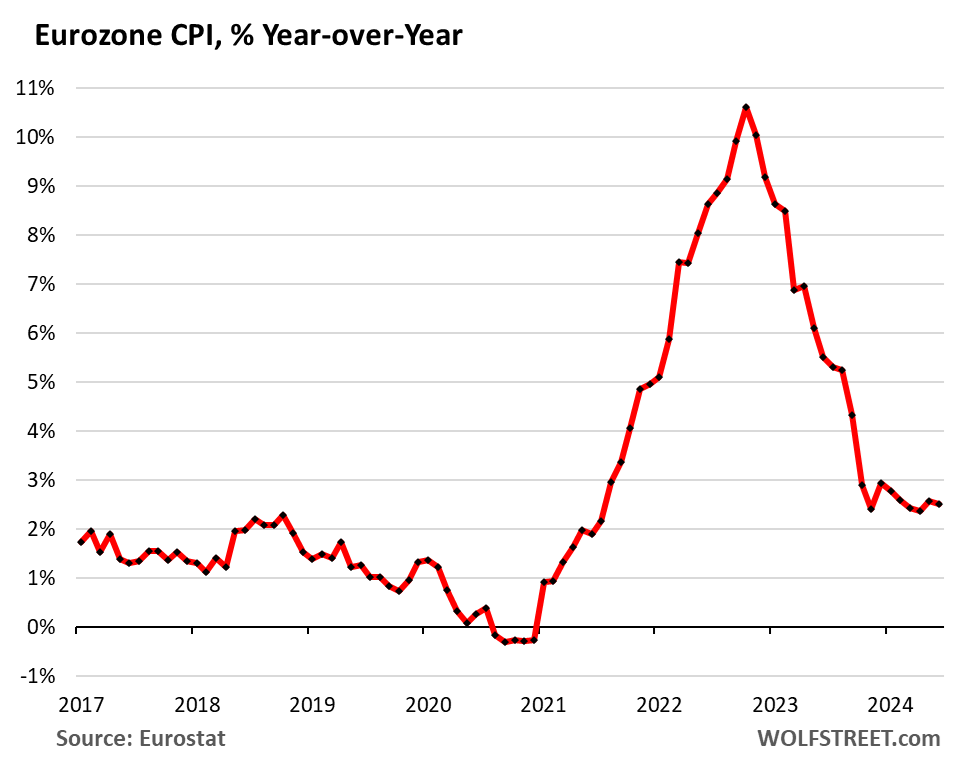
The ECB has cut its policy rate by 25 basis points to 4.25%, and is now arguing over how many more cuts this year. Two more cuts would bring the policy rate down to 3.75%.
The economy in the Euro Area has slowed substantially in 2023, with a near-0% growth rate, including a contraction in Q4. However, in Q1 2024, GDP growth picked up some. This lethargic economic growth and the moderation of inflation gave the ECB reasons to cut its policy rate.
But if services inflation remains at 4% and goods prices slow their descent, core CPI, now at 2.9%, will begin to edge higher and, instead of going toward the ECB’s 2% target, it would then migrate into the 3%-plus range.
And ECB president Christine Lagarde addressed this issue today – the issue being the fuel that contributes to services inflation: wage growth.
“Obviously, we don’t need to have services at 2% because manufacturing goods are below 2% and at the end of the day it’s going to be a balance between goods and services,” she said at a panel discussion today in Portugal, according to Bloomberg.
See in the chart above, before the pandemic, where service CPI ran higher than core CPI because the goods CPI was lower than core CPI. So services CPI running a little higher than core CPI is ok. But currently, services CPI is running much higher than core CPI.
“But we have to look really what is behind it,” she said. “And what’s behind it is a lot of wages. Services has a very high component of labor. Wages also suffer from the lag impact of the labor system that we have in Europe.”
Alas, wages and salaries jumped by 5.3% year-over-year in Q1, matching the record of Q4 2022. In Germany, they jumped by 6.3%, in the Netherlands, by 7.6%, in Austria by 9.8%, in Greece by 7.9%, in Portugal by 6.3%, in Spain by 4.5%. On the low side were France (+2.6%) and Italy (+3.3%).
So with this kind of wage growth, it’s unlikely that services inflation will slow down much from its 4% range and might head higher:

The forward-looking wage-growth measure that the ECB developed, based on newly negotiated collective bargaining agreements whose wage increases will be implemented in the future, jumped by 4.7% year-over-year, matching the Euro Area record of Q3 2023:

Enjoy reading WOLF STREET and want to support it? You can donate. I appreciate it immensely. Click on the beer and iced-tea mug to find out how:
Would you like to be notified via email when WOLF STREET publishes a new article? Sign up here.
Take the Survey at https://survey.energynewsbeat.com/



